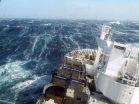Eating a lot of fish may help curb depression risk -- at least in Europe
Association equally significant among men and women, pooled data analysis shows
2015-09-11
(Press-News.org) Eating a lot of fish may help curb the risk of depression--at least in Europe--suggests a pooled analysis of the available evidence, published online in the Journal of Epidemiology & Community Health.
The association between a fishy diet and mental health appears to be equally significant among men and women, the first analysis of its kind indicates.
Depression affects an estimated 350 million people worldwide, and is projected to become the second leading cause of ill health by 2020.
Several previous studies have looked at the possible role of dietary factors in modifying depression risk, but the findings have been inconsistent and inconclusive.
The researchers therefore pooled the data from relevant studies published between 2001 and 2014 to assess the strength of the evidence on the link between fish consumption and depression risk
After trawling research databases, they found 101 suitable articles, of which 16 were eligible for inclusion in the analysis. These 16 articles included 26 studies, involving 150, 278 participants.
Ten of the studies were cohort studies, which involve monitoring a group of people who don't have the condition in question for a period of time to see who develops it. The remainder were cross-sectional: these look at the association between a condition and other variables of interest in a defined population at a single point in time or over a brief period.
Ten of the studies involved participants from Europe; 7 those from North America; the rest involved participants in Asia, Oceania, and South America.
After pooling all the data together, a significant association emerged between those eating the most fish and a 17% reduction in depression risk compared with those eating the least. This was found in both cohort and cross-sectional studies, but only for the European studies.
When the researchers looked specifically at gender, they found a slightly stronger association between high fish consumption and lowered depression risk in men (20%). Among women, the associated reduction in risk was 16%.
This is an observational study so no definitive conclusions can be drawn about cause and effect, added to which fish consumption was measured using different dietary assessment methods across the various studies. But there may be a plausible biological explanation for the link, suggest the researchers.
For example, it has been suggested that the omega 3 fatty acids found in fish may alter the microstructure of brain membranes and modify the activity of the neurotransmitters, dopamine and serotonin, both of which are thought to be involved in depression.
Furthermore, the high quality protein, vitamins, and minerals found in fish may help stave off depression, while eating a lot of fish may be an indicator of a healthy and more nutritious diet, suggest the researchers.
"Higher fish consumption may be beneficial in the primary prevention of depression," they conclude, adding: "Future studies are needed to further investigate whether this association varies according to the type of fish."
INFORMATION:
ELSE PRESS RELEASES FROM THIS DATE:
2015-09-11
Working 12+ hour shifts is linked to a heightened risk of burnout, job dissatisfaction, and intention to leave among hospital nurses in 12 European countries, finds research published in the online journal BMJ Open.
The findings run counter to the perceived value among both nurses and employers of working longer shifts, which are increasingly common practice in England, Ireland, and Poland, say the researchers.
Job satisfaction and burnout are global concerns in the nursing workforce, because of the potential impact they have not only on the quality and safety of patient ...
2015-09-11
A wide range of avoidable risk factors to health - ranging from air pollution to poor diets to unsafe water - account for a growing number of deaths and a significant amount of disease burden, according to a new analysis of 79 risks in 188 countries.
High blood pressure was the number-one individual risk factor associated with global deaths in 2013, contributing to 10.4 million deaths around the world that year. High blood pressure's impact on mortality grew by 49.1% between 1990 - when it was also the number-one global risk - and 2013. While this risk heavily impacts ...
2015-09-10
DALLAS, Sept. 10, 2015 -- Are you getting enough quality sleep? Are you sleeping longer than you should? Poor sleep habits may put you at higher risk for early signs of heart disease when compared to those who get adequate, good quality sleep, according to a study published in the American Heart Association journal Arteriosclerosis, Thrombosis and Vascular Biology.
"Inadequate sleep is a common problem and a likely source of poor health, including visible signs of disease, such as heart attack," said Chan-Won Kim, M.D., study co-lead author and clinical associate professor ...
2015-09-10
DALLAS, Sept. 10, 2015 - For better cardiovascular health, check your gut. Bacteria living in your gut may impact your weight, fat and good cholesterol levels, factors necessary to help maintain a healthy heart, according to new research in Circulation Research, an American Heart Association journal.
"Our study provides new evidence that microbes in the gut are strongly linked to the blood level of HDL (good cholesterol) and triglycerides and may be added as a new risk factor for abnormal blood lipids, in addition to age, gender, BMI and genetics," said Jingyuan Fu, Ph.D., ...
2015-09-10
They're the latest rage in jewelry and gadgetry, but like all computer devices, smart watches are vulnerable to hackers, say researchers at the University of Illinois at Urbana-Champaign.
Using a homegrown app on a Samsung Gear Live smart watch, the researchers were able to guess what a user was typing through data "leaks" produced by the motion sensors on smart watches. The project, called Motion Leaks through Smartwatch Sensors, or MoLe, has privacy implications, as an app that is camouflaged as a pedometer, for example, could gather data from emails, search queries ...
2015-09-10
Researchers at Scripps Institution of Oceanography at UC San Diego have released details of a deep-sea site roughly 48 kilometers (30 miles) west of Del Mar (just north of San Diego, Calif.) where methane is seeping out of the seafloor, the first such finding in the region.
Scripps graduate students on a 2012 UC Ship Funds Program expedition aboard Scripps's research vessel Melville off San Diego County discovered the "Del Mar Seep" during the San Diego Coastal Expedition. Such methane seeps are fascinating environments because of their extraordinary chemical features, ...
2015-09-10
Many of the drugs we take today to treat pain, fight cancer or thwart disease were originally identified in plants, some of which are endangered or hard to grow. In many cases, those plants are still the primary source of the drug.
Now Elizabeth Sattely, an assistant professor of chemical engineering at Stanford, and her graduate student Warren Lau have isolated the machinery for making a widely used cancer-fighting drug from an endangered plant. They then put that machinery into a common, easily grown laboratory plant, which was able to produce the chemical. The technique ...
2015-09-10
The Southern Ocean has begun to absorb more atmospheric carbon dioxide (CO2) according to new research from an international team, including the University of East Anglia.
A decade ago scientists announced that the amount of CO2 being absorbed by the Southern Ocean had not increased since the late 1980s. And it was feared that this 'carbon sink' might have begun to saturate.
But new research to be published tomorrow (Friday) in the journal Science reveals that rather than stalling, the amount of CO2 being absorbed is on the rise again.
It is thought that changes ...
2015-09-10
This news release is available in Japanese.
Inconveniently, the only current method to synthesize the chemotherapy agent etoposide is by using extracts from a plant, but researchers have successfully manipulated Nicotiana benthamiana (tobacco) to create a more immediate and potent precursor. Etoposide is a topoisomerase inhibitor used to treat a variety of malignancies, including lung cancer and leukemia. There is currently no way to produce etoposide without one of its precursors, podophyllotoxin, which is found in the slow-growing Himalayan Mayapple plant. Four ...
2015-09-10
This news release is available in Japanese.
In this Policy Forum, Jonas Meckling et al. discuss the need to close the gap between climate science and policy, arguing that targeted policies and economic incentives are the answer, rather than broad carbon taxes. As policymakers convene at the United Nations Climate Change Conference in December, pinpointing the best policies is critical for a more sustainable future. In theory carbon pricing poses as an efficient solution, but this has yet to be seen in practice. As the authors point out, carbon regulation imposes costs ...
LAST 30 PRESS RELEASES:
[Press-News.org] Eating a lot of fish may help curb depression risk -- at least in Europe
Association equally significant among men and women, pooled data analysis shows

